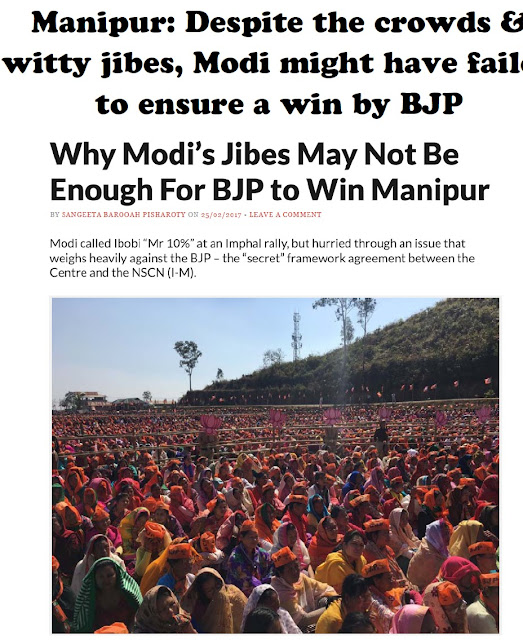Manipur: Despite the crowds & witty jibes, Modi might have failed to ensure a win by BJP
Sunday, February 26, 2017
Modi may have
appeared to have a successful rally in Manipur. The BJP pulled all stops,
defying boycott calls by rebels, successfully mobilised a crowd 15-20,000,
large by Manipuri standards. His jibes were also hard hitting “The Manipur
chief minister is known as Mr. 10% we need a chief minister who is 0%.”. And
yet, at the end of the day, all this fell drastically short to ensuring his
party win in Manipur.
He failed to address
the burning issue of the majority community – the Meiteis occupying the valley
districts, who have the biggest say in the polls – most wanted to hear. This
was the framework agreement signed between his government and the Nationalist
Socialist Council of Nagaland (Isak-Muivah) (NSCN I-M) on August 3, 2015, which
has since been kept under wraps.
For
some time now, the BJP has been working on a poll strategy largely based on anti-incumbency
sentiment against the Ibobi Singh government. It was when it thought things had
reached a tipping point, that the state government threw a googly. The BJP’s
unpreparedness in dealing with the surprise quickly indicates that its poll
strategists lacked a deep understanding of the ground realities that form the
social and political fabric of the state. Worse still, the party underestimated
Ibobi Singh.
Interestingly,
Ibobi Singh’s strategy to outdo the BJP looks like he has borrowed tools from
the same box that the BJP used for the assembly polls in Assam – ethnic
assertion of the majority community.
While
in Assam, the BJP poll strategists played on the “jati mati bheti” (ethnicity, land and base)
planks to seek a “poriborton”
(change) from the 15-year-old Congress government. In Manipur, they tried to
play the “development” and “clean government” cards in the disturbed and
backward state. Modi’s February 25 speech largely hinged on those points.
However,
the Congress chose to play the BJP’s “jati mati bheti” plank in Manipur,
knowing well that in the northeast, ethnic assertion and the majority
communities’ insecurity would be a far better unifier than “development”. In
fact, there were numerous examples to aid the state government’s decision – the
inner line permit (ILP) movement, the demand for scheduled tribe status for the
Meiteis, protests against the “secret” part of the framework agreement in the
form of placards that said “R N Ravi go back” – when he visited Imphal a couple
of times in 2015 and 2016 to consult civil society groups representing the
Meitei and Kuki communities on the framework agreement, without giving out the
“secret” part.
So,
if the BJP played on the Assamese bias against “illegal Bangladeshis” to
wrest the state from the Congress, the Congress in Manipur has targeted the ire
of the Meiteis – and also the Kukis – against the Nagas to reclaim power.
However,
it is important to note a nuance in the Congress’s approach. Targeting the
Meiteis and Kukis’ ire towards the Nagas was not aimed at the entire community,
but mainly at the two communities hatred of the NSCN (I-M) and its supreme
leader Th. Muivah – a Thankgul Naga from Manipur. He is a highly
unpopular figure among the Meiteis and Kukis and they consider him the
main propagator of the greater Nagalim demand – that talks of uniting the Naga
areas of Manipur, Nagaland, Assam and Arunachal Pradesh into a single whole.
Ibobi
Singh also simultaneously reworked the organisational part of the state
Congress. Kuki leader T. N. Haokip was made the head of the
Manipur Pradesh Congress Committee (MPCC), replacing Gaikhangam Gangmei, a
Naga, while he continued as the deputy chief minister. Gaikhangam, a Rongmei
Naga, is also considered to be opposed to the NSCN (I-M) and the United Naga
Council (UNC), an organisation seen as close to Muivah.
The
change of guard at the MPCC also put to rest a rebellion brewing among the
Congress MLAs, seen by some political observers in the state as “fuelled” by
the BJP “to destabilise the state government before the elections.”
In
August 2015, the state assembly also passed three bills with clever phrasing
that weighed heavily in favour of the Meiteis and their land rights. The move
might have triggered violence in Churachandpur, the largest hill district of
the state, giving the BJP an opportunity to try and gain ground in that area
but in turn, it helped the Congress gain further credence among the Meiteis –
and gradually among the Kukis too. Thus, there too, the Congress poll
strategists scored over those of the BJP.
Read full article: HERE

0 comments